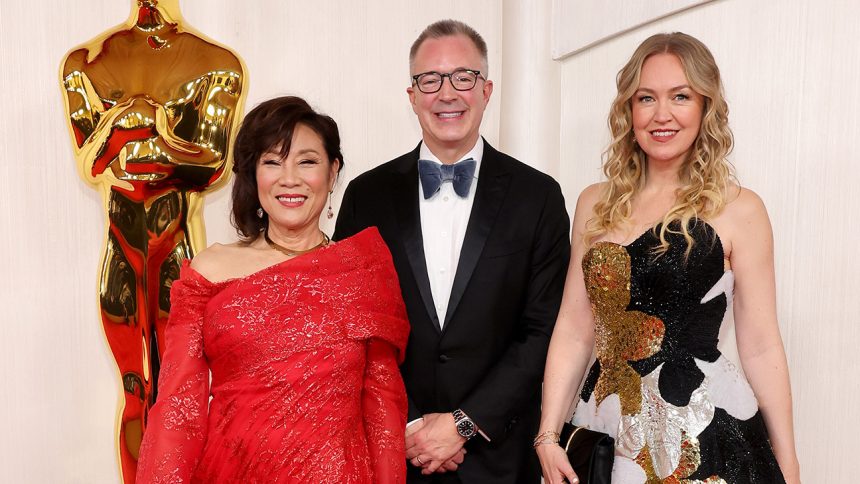Oscars: Who Will Succeed Outgoing Film Academy President Janet Yang?
At the end of July, for the first time since August 2022, there will be a changing of the guard at the top of the Academy of Motion Picture Arts and Sciences.
The Academy’s day-to-day operations and employees (some 700 are spread across locations in L.A., New York and London) are overseen by a well-paid CEO, a position held since June 2022 by veteran fundraiser Bill Kramer. He’s not going anywhere. But the members of the organization — currently numbering around 11,000 and based in more than 80 countries around the world — are led by an unpaid president chosen from amongst, and by, the governors on its 55-person board, who are themselves Academy members elected by their peers. That role has been filled since August 2022 by producer Janet Yang, just the 36th person — and only the fourth woman and second person of color — elected to it since the founding of the Academy in 1927.
Yang was re-elected to the presidency in 2023 and 2024, and almost certainly would have won re-election again this cycle if she were allowed to seek it. But given that she is about to complete her second three-year stint as a governor, term limits require her to step away from the board for at least two years (after which she will be eligible to serve two more terms as a governor, and up to four more consecutive years as president). And that means that the Academy’s board for 2025-2026 — which was solidified in June via elections and appointments — must soon pick a new top officer.
This seems a fitting moment to look back on Yang’s tenure — and ahead to who is poised to succeed her, based on THR’s reporting.
You Might Also Like
* * *
Yang, 68, the Queens-born daughter of Chinese immigrants, joined the Academy in 2002, but was not especially active within the organization until Chris Rock made Asian children the butt of a joke during the 2016 Oscars telecast. After that, she rallied dozens of fellow Academy members of Asian descent to lean on the Academy’s leadership to do better, resulting in an apology from the organization’s then-CEO Dawn Hudson and a commitment to work more closely moving forward.
The savvy manner in which Yang advocated for change — including inviting Hudson, in 2017, to a reception for new Asian Academy members — led the Academy to ask her, in 2018, to serve on its A2020 Committee, which was tasked with recruiting diverse members of the filmmaking community to join the Academy. In 2019, she was appointed to the board as one of three governors-at-large, a position created in the wake of #OscarsSoWhite to make sure that inclusion is top-of-mind in board deliberations. And in 2020, she was chosen by the board to chair its membership and governance committee.
By the time casting director David Rubin was forced by term limits to vacate the presidency of the Academy in 2022, Yang was admired enough to be chosen as his successor over fellow producer and governor-at-large DeVon Franklin. And over the three years since, she, in close collaboration with Kramer, has presided over a period of relative tranquility at the Academy, especially considering that they both came to office in the wake of not only #OscarsSoWhite and the unrest caused by Rock at the 2016 Oscars, but also the Moonlight/La La Land debacle in 2017; the shocking Will Smith slap in 2022; the controversial decision, ahead of the 2022 telecast, to not air live or in their entirety Oscars for eight below-the-line categories, provoking outrage from many members; and the two lowest-rated Oscars telecasts on record, in 2021 and 2022.
Yang inherited a few headaches — for example, the Academy’s polarizing “inclusion standards” that have to be met for a film to be eligible for the best picture Oscar were approved in 2020, but took effect in 2024. (They appear to have had little impact in any direction.) And she created a few other headaches for herself. She championed, in a quickly-deleted 2023 social media post, her friend Michelle Yeoh for the best actress Oscar for Everything Everywhere All at Once, resulting in a new rule prohibiting such endorsements from governors. And she and Kramer put out a weak statement in the aftermath of the assault of Palestinian filmmaker Hamdan Ballal just days after he was awarded the best documentary Oscar, for which they took considerable flack and ultimately apologized.
But for the very most part, the Kramer/Yang era has been extremely well-regarded by people inside and outside of the Academy.
Some things happened during Yang’s presidency that probably would have happened under any other — for instance, the restoration of equal treatment of all categories on the Oscars telecast, and the continued growth of the Academy Museum Gala, a glitzy fundraiser to support the Academy Museum of Motion Pictures that was first held the year before Yang’s election, but that has since grown into the Met Gala of the west, helping to generate considerable publicity and revenue for the museum.
But her personal stamp has been evident in other ways. The number of Academy members based outside of the U.S., which began to grow in the aftermath of #OscarsSoWhite (paving the way for Parasite to become the first non-English-language best picture Oscar winner in 2020), has soared during her tenure (non-Americans now account for some 25 percent of the membership). She and Kramer have traveled extensively to personally cultivate these new members, and this year, for the first time, there was at least one non-American nominee in every category.
In 2023, she and the board implemented a larger theatrical release requirement for films to be eligible for best picture starting in 2024, which was not particularly appreciated by the streamers, but which champions of the theatrical experience certainly appreciated, particularly in the wake of the darkest days of the pandemic.
After decades without the addition of a new Oscar category, she and the board approved an Oscar for casting in 2024 (which will be presented for the first time in 2026) and an Oscar for stunts in 2025 (which will debut in 2028). The Academy’s longtime broadcasting partner for the Oscars, ABC, would surely prefer a ceremony with fewer categories and a shorter runtime, but the casting and stunt communities, as well as their allies, are overjoyed.
And, perhaps most importantly, ahead of the 2028 expiration of the Academy and ABC’s current deal, which provides the Academy with the bulk of its operating revenue, ratings for the Oscars telecasts that have taken place under her watch have ticked up each year (18.7 million in 2023, up from 16.62 in 2022; 19.5 million in 2024 and 19.7 million in 2025); the Oscars joined the modern world by streaming live, for the first time, in parts of Europe in 2023, and in the U.S. in 2025; and the tone of the Oscars ceremonies has become markedly less snarky, more celebratory and almost entirely apolitical — all of which should help the Academy’s negotiating position moving forward.
* * *
Which brings us to the question of who will succeed Yang.
Candidates for the Academy’s presidency almost always have come from the pool of existing officers. The officers during Yang’s final term have been Howard A. Rodman (vice president/secretary), Donna Gigliotti (vice president/treasurer), Lynette Howell Taylor (vice president), Lesley Barber (vice president) and DeVon Franklin (vice president). Gigliotti and Franklin are terming out alongside Yang. Which leaves Rodman, Howell Taylor and Barber.
THR has learned that Rodman, a screenwriter and former president of the Writers Guild of America-West who, for 25 years, until earlier this year, was a professor at the USC School of Cinematic Arts, has decided not to pursue the presidency. And we hear that Barber, a Canadian composer best known for her work with Kenneth Lonergan (she scored 2000’s You Can Count on Me and 2016’s Manchester by the Sea), who currently chairs the Academy’s membership committee (as did Yang before running for president), was mulling a run, but has not actively pursued one. (Candidates must be nominated by a fellow governor before the end of the day on Thursday.)
So the overwhelming expectation among insiders — many of whom are excited about the prospect — is that Yang’s successor will be Howell Taylor, a widely liked and respected producer of acclaimed indies (e.g. 2006’s Half Nelson, 2010’s Blue Valentine and 2016’s Captain Fantastic) and studio films (e.g. 2018’s A Star Is Born, for which she received a best picture Oscar nom, and The Accountant 2, a hit earlier this year).
Howell Taylor, who became a member of the Academy in 2014, is certainly qualified for the job. She produced the 2020 Oscars telecast with Stephanie Allain; was elected to the board later that year; and has chaired the board’s Awards Committee, which is integrally involved with the planning of all aspects of the Oscars ceremonies, for the last three years. (The 2024 telecast was awarded four Emmys, including best live variety special for the first time, and the 2025 telecast was nominated on Tuesday for six, including that same honor.)
A native of Liverpool, England, who moved to Hollywood at 22, Howell Taylor is just 46 years old. If elected, she would be the first president of the Academy born outside of the U.S. in 28 years (following Frank Lloyd of Scotland, Frank Capra of Italy, Jean Hersholt of Denmark and, most recently, Arthur Hiller of Canada) and the youngest president of the Academy in 70 years (since George Seaton took office at 44).
She has a full plate: she and her husband, Endeavor Content co-president Graham Taylor, have two young kids; the family recently lost their home in the Pacific Palisades wildfire; and she has a film, Derek Cianfrance’s Roofman, starring Channing Tatum, coming out later this year. But she is known to be indefatiguable; understands the inner-workings of the Academy and the Oscars, and could therefore hit the ground running; and would only have to/be able to serve for one year, since a year from now she will be forced by the same term-limit as Yang to step away from the board for two years before potentially continuing.






